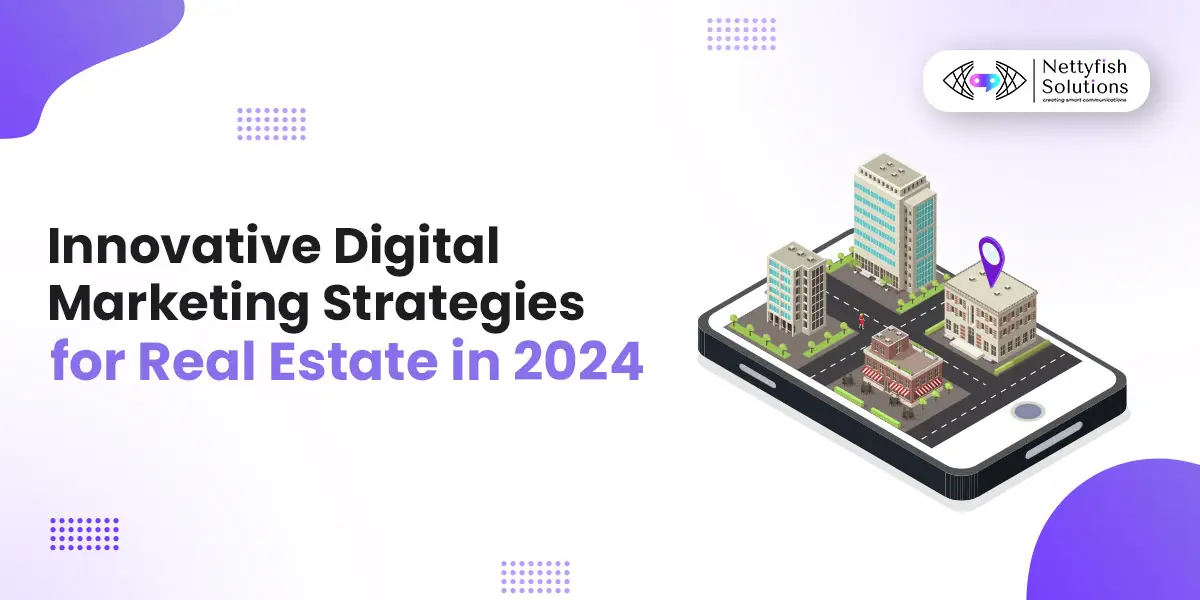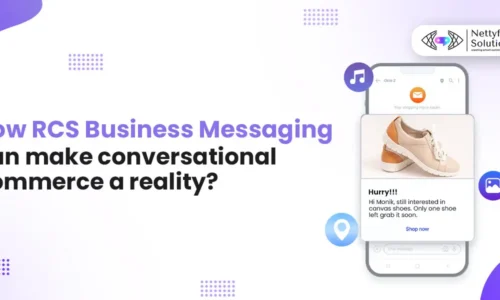- Admin@nettyfish
- digital marketing strategies, digital marketing strategies for small business, digital marketing tips for Real Estate Business, digital marketing tips for small businesses
- 0 Comments
- 11551 Views
Innovative Digital Marketing Strategies for Real Estate in 2024
In 2024, the real estate market will be more competitive than ever, making it essential for businesses to leverage innovative digital marketing strategies to stand out. Whether you’re a small business or a large real estate firm, adopting the right digital marketing techniques can significantly enhance your online presence, attract potential buyers, and drive sales. This blog will explore the most effective digital marketing strategies for real estate in 2024, providing valuable tips and insights for both small businesses and established companies.
In 2024, the real estate market will be more competitive than ever, making it essential for businesses to leverage innovative digital marketing strategies to stand out. Whether you’re a small business or a large real estate firm, adopting the right digital marketing techniques can significantly enhance your online presence, attract potential buyers, and drive sales. This blog will explore the most effective digital marketing strategies for real estate in 2024, providing valuable tips and insights for both small businesses and established companies.
Understanding the Digital Landscape
The digital landscape in 2024 is characterized by rapid advancement in technology and changing consumer behaviors. With more people relying on the internet to search for properties, digital marketing has become a critical component of any successful real estate strategy. Here are some essential digital marketing tips for real estate businesses to help navigate this landscape:
Social media platforms remain powerful tools for reaching potential buyers and building brand awareness. Platforms like Facebook, Instagram, LinkedIn, and even TikTok offer unique opportunities to showcase properties and engage with your audience.
- Visual Content: Utilize high-quality images, virtual tours, and videos to create visually appealing content that attracts potential buyers.
- Targeted Advertising: Use social media ads to target specific demographics, such as location, age, income level, and interests, ensuring your ads reach the right audience.
- Engagement: Regularly interact with followers by responding to comments, hosting live Q&A sessions, and sharing informative content about the real estate market.
2. Optimize Your Website for SEO
Search engine optimization (SEO) is crucial for increasing your website’s visibility organically on search engines like Google & Bing. By optimizing your site, you can attract organic traffic from users searching for real estate properties.
- Keyword Research: Identify and incorporate relevant keywords that potential buyers are likely to use when searching for properties. Include long-tail keywords to be more specific example “affordable homes in [city]” or “luxury apartments for sale in [city].”
- Quality Content: Create informative and engaging content, such as blog posts, guides, and market reports, that provides value to your audience and improves your site’s SEO ranking.
- Mobile Optimization: Ensure your website is mobile-friendly, as many users search for properties on their mobile devices. A responsive website design helps to improve user experience and SEO performance.
3. Invest in Pay-Per-Click (PPC) Advertising
PPC advertising is a more effective way to drive immense targeted traffic to your website. By bidding on keywords related to real estate, you can appear at the top of search engine results pages (SERPs) and attract potential buyers.
- Google Ads: Create compelling ad copy and use ad extensions to provide additional information, such as property locations, contact details, and links to specific listings.
- Remarketing: Implement remarketing campaigns to target users who have previously visited your website, keeping your brand top-of-mind and encouraging them to return.
4. Utilize Email Marketing
Email marketing remains a powerful tool for nurturing leads and maintaining relationships with potential buyers. By sending targeted and personalized emails, you can keep your audience informed about new listings, market trends, and special offers.
- Segmentation: Segment your email list based on criteria such as location, property preferences, and buying stage to send relevant content to each group.
- Automation: Use email automation to send drip campaigns that guide prospects through the buying journey, from initial inquiry to closing the deal.
- Engaging Content: Include visually appealing images, videos, and virtual tours in your emails to capture the attention of your audience.
5. Implement Virtual Tours and Augmented Reality
Incorporating virtual tours and augmented reality (AR) into your marketing strategy can provide an immersive experience for potential buyers, allowing them to explore properties from the comfort of their homes.
- Virtual Tours: Offer 360-degree virtual tours of your properties, enabling buyers to walk through homes and get a feel for the space without physically being there.
- AR Apps: Develop AR apps that allow users to visualize how a property would look with different furnishings and decor, helping them envision themselves living in the space.
6. Harness the Power of Video Marketing
Video marketing is a compelling way to showcase properties and engage with your audience. High-quality videos can capture the attention of potential buyers and provide them with a comprehensive view of your listings.
- Property Tours: Create detailed property tour videos that highlight the key features and amenities of each listing.
- Testimonial Videos: Share testimonial videos from satisfied clients to build trust and credibility with potential buyers.
- Live Streaming: Use live streaming platforms to host virtual open houses and Q&A sessions, allowing buyers to interact with you in real time.
7. Utilize Chatbots and AI
Integrating chatbots and artificial intelligence (AI) into your digital marketing strategy can enhance customer service and streamline communication with potential buyers.
- 24/7 Support: Chatbots can provide instant responses to common queries, offering 24/7 support and improving the overall customer experience.
- Lead Qualification: Use AI to qualify leads by asking relevant questions and directing high-intent buyers to your sales team for further follow-up.
8. Leverage Influencer Marketing
Influencer marketing can help you reach a broader audience and build credibility in the real estate market. Partner with local influencers, bloggers, and industry experts to promote your properties and brand.
- Collaborations: Collaborate with influencers to create content that showcases your properties and highlights their unique features.
- Reviews and Testimonials: Encourage influencers to share their experiences with your brand, providing authentic reviews and testimonials that resonate with their followers.
9. Optimize for Local SEO
Local SEO is essential for real estate businesses looking to attract buyers in specific geographic areas. By optimizing your online presence for local searches, you can increase your brand’s visibility among potential buyers in your target market and targeted location.
- Google My Business: Create and optimize your Google My Business profile, ensuring all information is accurate and up-to-date.
- Local Keywords: Use local keywords in your website content, blog posts, and meta descriptions to improve your ranking in local search results.
- Customer Reviews: Encourage satisfied clients to leave positive reviews on your Google My Business page and other review platforms.
10. Analyze and Adjust Your Strategy
Regularly analyzing the performance of your digital marketing campaigns is crucial as it helps in continuous improvement. Use analytics tools to track key metrics such as website traffic, time spent, backlinks, conversion rates, and engagement levels.
- A/B Testing: Conduct A/B tests to determine which marketing strategies and tactics are most effective for your audience.
- Adjust and Optimize: Based on your analysis, make data-driven adjustments to your campaigns to optimize performance and achieve better results.
Conclusion
In 2024, digital marketing strategies are more critical than ever for real estate businesses looking to thrive in a competitive market. By leveraging social media marketing, SEO, PPC advertising, email marketing, virtual tours, video marketing, chatbots, influencer marketing, local SEO, and continuous analysis, you can create a comprehensive digital marketing strategy that drives engagement, attracts potential buyers, and boosts sales.
Whether you’re a small business or an established firm, these innovative digital marketing tips for real estate businesses will help you stay ahead of the curve and achieve your marketing goals. Or you can contact Nettyfish Solutions and we’ll be well on our way to building a successful and sustainable strategy for your real estate business in the digital world.
Read Our Related Articles:
- Top Digital Marketing Agencies in Chennai to Boost Your Online Presence in 2024
- The Ultimate Guide to Choosing the Best Website Development Company in Chennai
- Maximizing Engagement Why RCS is Essential for Your Marketing Strategy in 2024
- How Can You Leverage RCS Messaging For Your Business?
- RCS The Ultimate Game-Changer for Business Messaging in 2024
- How to Improve Website Performance
- X Reasons Why Your Text Message Didn’t Get Delivered





